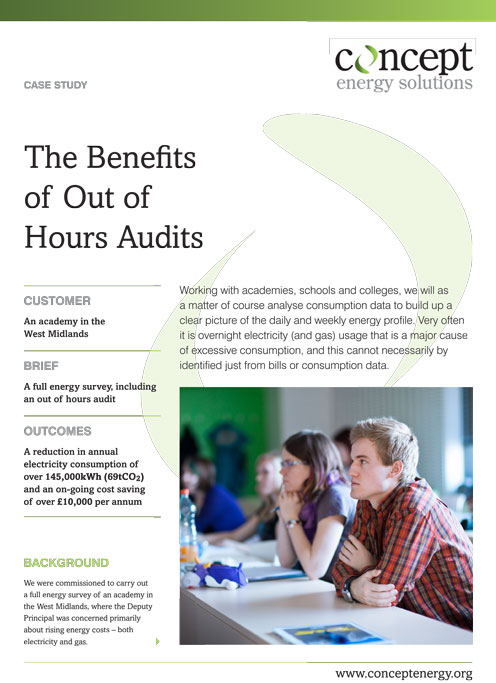The Benefits of Out of Hours Audits
Customer: Academy in the West Midlands
Sector: Education
Focus: Energy audits (out of hours)
Working with academies, schools and colleges, we will as a matter of course analyse consumption data to build up a clear picture of the daily and weekly energy profile. Very often it is overnight electricity (and gas) usage that is a major cause of excessive consumption, and this cannot necessarily by identified just from bills or consumption data…
Background: We were commissioned to carry out a full energy survey of an academy in the West Midlands, where the Deputy Principal was concerned primarily about rising energy costs – both electricity and gas.Our Analysis: Before carrying out the site survey, we obtained electricity and gas consumption data. The profile below shows the electricity supply from a typical term-time week at the academy and illustrates clearly the daytime peak when the building is occupied and operating “normally”.
Of particular concern to us was the high level of electricity used overnight, when the building was unoccupied. We recognised that there would be some requirement for essential services, but from our extensive experience of colleges and academies this looked higher than expected.
Daytime Energy Survey: our energy surveys are always thorough and so we were able to gather details of all the significant items of equipment installed, to get an idea of the main uses of energy in the college. We studied the controls for lighting and individual items of equipment as well as interrogating the Building Energy Management System (BMS) which had been installed to control the main items of plant. We noted the time schedules that had been configured for the heating, ventilation and air-conditioning plant, together with other equipment, and found that in general the plant was scheduled to switch off at the end of the working day (including evening activities).
It was clear that more work was required to establish the cause of the high overnight baseload.
Night Study: having agreed on a suitable date for the survey, we arrived an hour before the academy was due to be fully vacated (it was a Thursday evening) and toured the building, in particular the four plant rooms, to note the equipment that was operating. After all students and staff (and parents) had left the site we repeated the tour, to record everything that was still running and then interrogated the BMS to check the status of plant showing on the screen – most plant should have been switched off.
Although not a surprise to us, the comparison of BMS status with plant actually found to be operating was a shock to the maintenance team at the academy – it was clear that the control by the BMS of several major items of plant (air handling units, pumps) had failed and that these were now operating continuously.
The Outcome: our report detailed all the equipment that had been noted as operating overnight and by discussion with the maintenance manager we agreed on what was considered “essential” plant, running legitimately. This left around 45kW of electrical load relating to equipment that could be switched off, and so the next step was to agree on a plan of action to repair/replace the controls either locally or via the BMS. We worked with the controls contractor to correct the problems and the results were almost instant, and spectacular (see profile below).
Benefits: By controlling plant effectively, we helped to reduce the typical overnight baseload by over 40kW, which meant a reduction in annual electricity consumption of over 145,000kWh (69tCO2) and an on-going cost saving of over £10,000 per annum.




